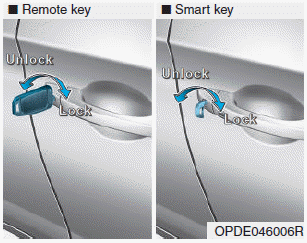Hyundai i-30: Engine Control System / Electric Exhaust Gas Recirculation (EEGR) Control Valve
Hyundai i30 (PD) 2018-2025 Service Manual / Engine Control / Fuel System / Engine Control System / Electric Exhaust Gas Recirculation (EEGR) Control Valve
Description and operation
| Description |
The Electric EGR Control Valve is installed in between the EGR cooler and the
exhaust line and is a solenoid valve. This valve controls EGR (Exhaust Gas Recirculation)
amount by the ECM's duty control signal depending on engine load and the need
of intake air.
The Exhaust Gas Recirculation (EGR) system is used to add the exhaust gas to
intake air in order to reduce an excess of air and the temperature in the combustion
chamber.

Specifications
| Specification |
[Motor]
|
Item |
Specification |
|
Coil Resistance (Ω) |
2.21 - 2.99 [20°C (68°F)] |
[Position Sensor]
|
Item |
Specification |
|
Sensor Power (V) |
5 |
|
Closed Voltage (V) |
3.85 - 4.15 |
|
Opened Voltage (V) |
0.75 - 1.25 |
Schematic diagrams
| Circuit Diagram |

Harness Connector

Repair procedures
| Inspection |
[Motor]
| 1. |
Turn the ignition switch OFF.
|
| 2. |
Disconnect the EEGR valve connector.
|
| 3. |
Check that the EEGR valve is stuck by foreign material.
|
| 4. |
Measure resistance between motor 4 and 5 control terminals of the motor.
|
| 5. |
Check that the resistance is within the specification.
▷ Specification
|
[Feedback Position Sensor]
| 1. |
Connect the diagnostic tool to the data link connector.
|
| 2. |
Perform the fully open and the fully closing operation of the EEGR valve
by using the actuation test.
|
| 3. |
Check that the voltage is within the specification
▷ Specification
|
| Removal |
| 1. |
Turn the ignition switcg OFF, and disconnect the battery negative (-)
terminal.
|
| 2. |
Remove the EGR cooler.
(Refer to Engine Mechanical System - "EGR Cooler")
|
| 3. |
Remove the EEGR control valve after loosening the mounting bolt (A).
|
| Installation |
|
| 1. |
Install in the reverse order of removal.
|
 RCV Control Solenoid Valve
RCV Control Solenoid Valve
Description and operation
Description
RCV (Recirculation Valve) Control Solenoid Valve is installed on the cooling
pan motor top and operates the RCV actuator which controls the by-pass passage
of the turbo-charger compressor...
 Thermal Management Module (TMM) Motor
Thermal Management Module (TMM) Motor
Description and operation
Description
Integrated thermal management module (ITM) is a device that controls the coolant
flow rate according to coolant temperature...
Other information:
Hyundai i30 (PD) 2018-2025 Service Manual: Differential Pressure Sensor (DPS)
Description and operation Description Differential Pressure Sensor (DPS) is measure the pressure difference of EGR inlet and outlet. Schematic diagrams Circuit Diagram Harness Connector Repair procedures Removal 1...
Hyundai i30 (PD) 2018-2025 Service Manual: Special service tools
..
Categories
- Manuals Home
- 3rd Generation i30 Owners Manual
- 3rd Generation i30 Service Manual
- Engine coolant
- Shift-lock system. Shift-lock release
- Scheduled maintenance services
- New on site
- Most important about car
Door locks
Operating door locks from outside the vehicle
Mechanical key

Turn the key toward the rear of the vehicle to unlock and toward the front of the vehicle to lock.
If you lock/unlock the driver's door with a key, a driver’s door will lock/unlock automatically.
Copyright © 2025 www.hi30.net


